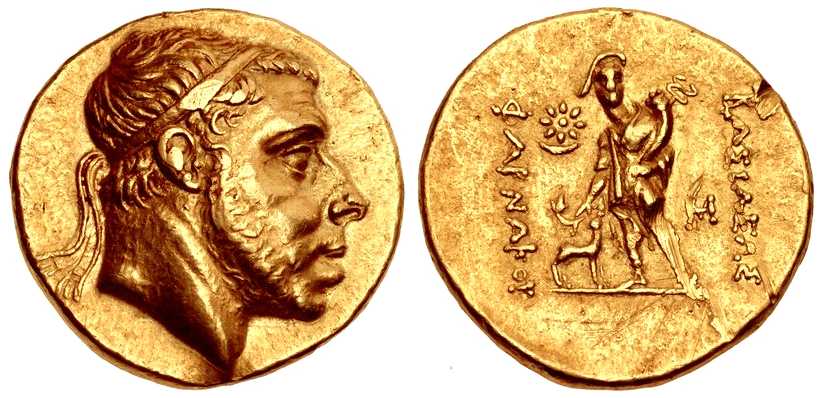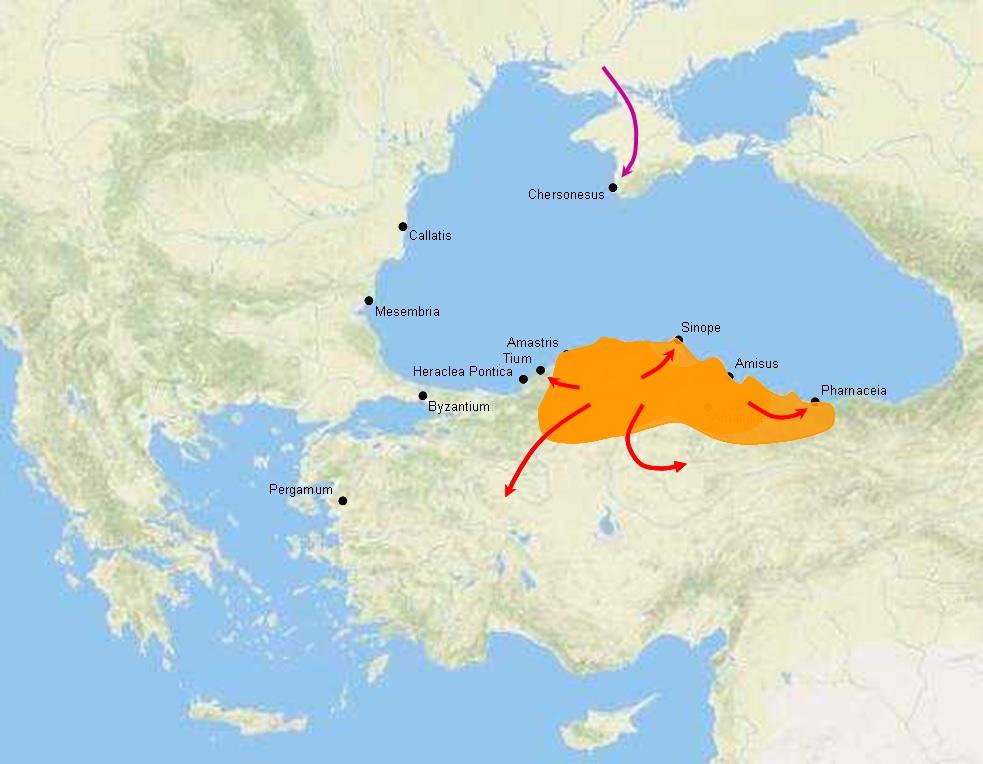Pharnaces I / Φαρνάκης Α' 185-159 BC
183 BC Pharnaces succeeded
in reducing the important city
of Sinope, which had been long an object of ambition to the Kings of
Pontus. The Rhodians sent an embassy to Rome to complain of this
aggression, but without effect. Disregarding the potential for an
international incident, Pharnaces proceeded to celebrate the conquest
by founding the city of Pharnaceia from two of Sinope's former
colonies. He also made Sinope the new primary residence of the Pontic
Kings.

|
SHH v4154
Pharnaces / Hermes
CNG Triton
XIX/2053
|
|
The
articles of the Peace of Apameia (188 BC), which granted
Phrygia to the Attalic king, Eumenes II Scoter of Pergamon, rankled
with Pharnaces I, who also claimed rights over parts of Phrygia. A
dispute ensued, which led to repeated embassies from both monarchs to
Rome, as well as to partial hostilities. But in the spring of 181 BC,
without waiting for the return of his ambassadors, Pharnaces I mounted
an invasion of Galatia and Paphlagonia trying to enforce his claims.
This resulted in conflict with Eumenes II, Prussias II of Bithynia,
Ariarathes IV of Cappadocia and the Paphlagonian Morzius.
Pharnaces was supported by Mithradates of Armenia
Minor and |
Seleucus IV. Roman commissioners attempted
to haltthe war through arbitration, but
when they decided that Pharnaces' demands were unreasonable, the
fighting continued. Pharnaces' general Leocritus (Λεώκριτος) occupied
Tius (Τίον) in Bithynia. In an effort to suppress the resistance of the
Pontic cities Pharnaces had the Sarmatian chieftain Gatalus attack the
Tauric Chersonesus, a colony of Heraclea Pontica. The conflict only
came to an end 179 BC, after the exhaustion of the Pontic kings'
military and financial resources forced him to withdraw. He was
compelled to purchase peace with the cession of all his conquests in
Galatia and Paphlagonia, with the exception of Sinope. Heavy
reparations were imposed on Pontos and Armenia Minor. The peace treaty
also required from Pharnaces to protect Chersonesus Taurica, Mesembria
and Heraclea Pontica from Sarmatian attacks.
Pharnaces married a Seleucid Princess called Nysa, who was the child of
princess Laodice IV and crown prince Antiochus. Nysa and Pharnaces were
related as the parents of Nysa were his first cousins. Pharnaces
married Nysa either in 172 BC or 171 BC, through the diplomatic work of
the Seleucid King Demetrius I Soter.
Honorific statues and inscriptions have survived that were dedicated to
Pharnaces and Nysa. Pharnaces set about to establish good relations
with the citizens of Athens and the Greek island of Delos. He made a
benefaction to the people of Athens. The exact nature of the
benefaction is unknown; Pharnaces may have made some kind of voluntary
donation to Athens, possibly soon after 183 BC. A lengthy honorific
inscription from the Athenians on Delos honours Pharnaces and Nysa.
They received a crown of gold from them and bronze statues of
themselves were set up on Delos. Their lengthy Athenian honorific
inscription is dated in the Archonship of the Athenian Tychandrus or
Tychander which is now generally accepted as 160 BC or 159 BC.
Nysa bore Pharnaces two children: a son called Mithradates V of Pontus
and a daughter called Nysa of Cappadocia, who is also known as Laodice.
|

 Mithradates III
Mithradates III Alexandrine Empire after Ipsos Battle
Alexandrine Empire after Ipsos Battle Regnum
Ponticum
Regnum
Ponticum
